

- Phone
- Email puppypetite@aol.com
-
Address
8002 17th Ave, Brooklyn NY 11214
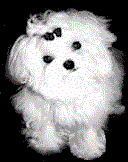
How To House Train A Pomeranian Puppy
Learning how to house train a Pomeranian puppy is a non-negotiable for Pomeranian puppy owners. House training, also known as housebreaking or potty training, is a critical phase in a dog's life where they learn to do their business outside or in a designated area inside the home. The process involves three major components:
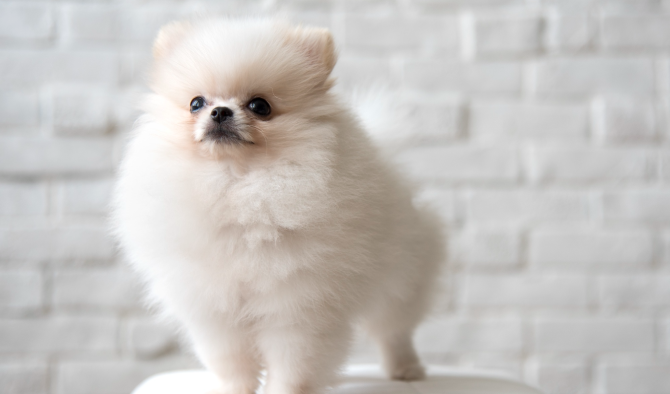

Consistency
Maintaining a regular feeding schedule and taking the dog out consistently are key. This predictability helps the dog understand when and where it's appropriate to eliminate.
Supervision
Keeping an eye on the dog, especially when they're young or new to the household, is important. Signs that the dog may need to go out, like sniffing around or circling, should trigger a quick trip outside.
Positive reinforcement
Rewarding the dog with praise, treats, or toys immediately after they've eliminated in the correct place helps reinforce the positive behavior. It's important to reward them promptly so the dog associates the reward with the desired action.
Getting to Know Your Pomeranian Puppy
Pomeranian puppies are known for their spirited and playful nature. They possess an exuberant personality, often behaving like they're big dogs trapped in a small body. This breed is intelligent, curious, and quick to learn, which can be both an advantage and a challenge when it comes to house training.
Pomeranians are often easily motivated by praise and rewards, making positive reinforcement particularly effective with this breed. Their intelligence can make them quick learners when it comes to Pomeranian potty training schedules and routines. However, their spirited nature sometimes leads to stubbornness, meaning they might try to test boundaries. Therefore, maintaining consistency and supervision, as mentioned earlier, is crucial.
Moreover, Pomeranians are known to be somewhat territorial, and they tend to mark their territory frequently. This characteristic can be a challenge during house training, requiring a vigilant eye to quickly redirect any attempts to 'mark' inside the house to the designated area or outside.
Lastly, Pomeranians are a very alert breed and can be wary of new environments and people, which might lead to anxiety-induced accidents. Patience, understanding, and positive reinforcement are key to helping your Pomeranian puppy overcome these challenges and become fully house trained.
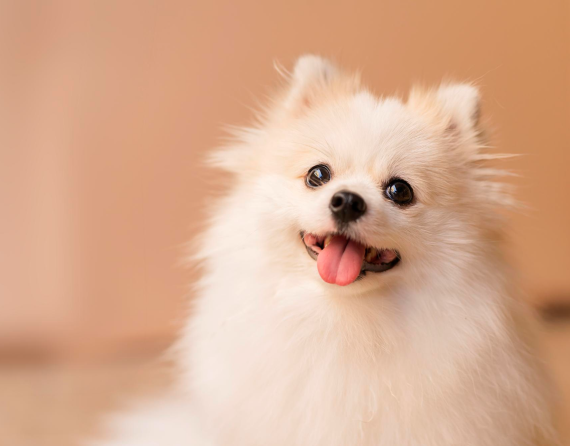
House Training Supplies and Starting to Train Your Pomeranian Puppy
Before beginning the house training process, you will need some essential supplies:
Crate
A crate is a good tool to limit your puppy's space and keep them safe when you're not around to supervise. Make sure to choose a crate that's comfortable and appropriate for your Pomeranian's size.
Puppy Pads
These can be very useful, especially in the early stages of training. They provide a designated area for your puppy to go when they can't make it outside.
Treats
Positive reinforcement is a key part of house training. Have small treats ready to reward your puppy immediately after they relieve themselves in the correct area.
Leash
It's important to take your puppy outside regularly, and a leash will help with this.
Now that you have your supplies, let's look at the steps for house training your Pomeranian puppy:
Establish a Routine
Pomeranians thrive on routine. Feed your puppy at consistent times and take them out to relieve themselves frequently. Start by taking them out every two hours and gradually increase the time as they gain better bladder control.
Use the Crate
Use the crate when you can't supervise your puppy. When they're in the crate, they're less likely to have an accident because dogs naturally avoid eliminating in their sleeping areas.
Use Puppy Pee Pad
If you're not able to take your puppy outside frequently, use puppy pads. Place them in a consistent location. When your puppy starts to show signs of needing to go, lead them to the pad.
Reward Success
Always reward your puppy immediately after they've relieved themselves in the correct area. This helps them associate the action with positive reinforcement.
Clean Accidents Thoroughly
Despite your best efforts, accidents will happen. Clean them up promptly and thoroughly to prevent your puppy from associating the smell of the area with a bathroom.
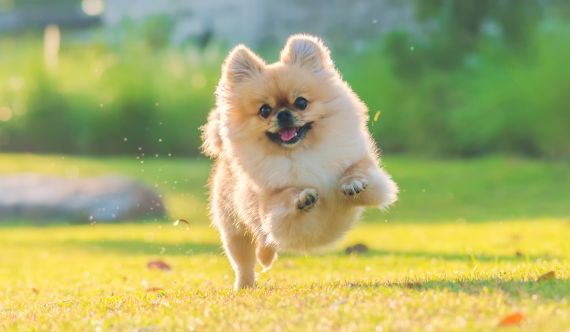
Utilizing a Litter Box
While not as common as in cats, litter box training can also be an effective solution for small dogs like Pomeranians. Here's a guide to get you started with this method:
Choose the Right Box and Litter
Opt for a shallow box that's easy for your small puppy to step into. As for the litter, unscented, dust-free options are often best for dogs.
Place the Box in an Appropriate Area
The box should be placed in a quiet, low-traffic area, but one that's easily accessible to your puppy. It's a good idea to place a puppy pad under the box to catch any stray litter.
Introduce Your Puppy to the Litter Box
Let your puppy explore the box under your supervision. Encourage them to step into it and ensure they feel comfortable.
Establish a Routine
Just like with outdoor Pomeranian training, establish and stick to a regular feeding and potty schedule. Consistently lead your puppy to the litter box after meals and naps.
Reward Success
If they eliminate in the litter box, reward them immediately with treats and praise.
Clean the Litter Box Regularly
Dogs are clean animals and may be reluctant to use a dirty litter box. Scoop out soiled litter daily and regularly replace the entire litter to maintain cleanliness and minimize odor.
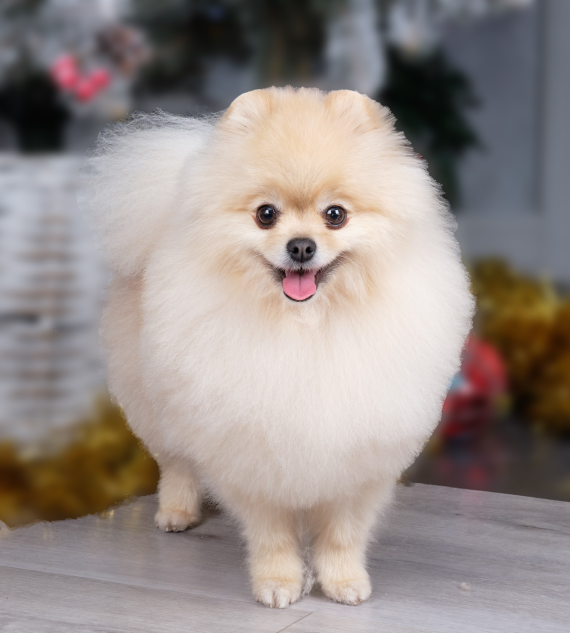
The Timeline in Training Pom Puppies
Training your Pomeranian puppy is a gradual process, and the timeline can vary depending on the puppy's individual pace of learning and consistency in training.
Weeks 1-2
During the first two weeks, focus on introducing your puppy to their new home and establishing a consistent routine for feeding and potty breaks. Begin crate training, limiting the time in the crate to short periods.
Weeks 3-4
During this period, continue with the established routine. As your puppy gets comfortable with the crate and their new surroundings, they should begin to understand where they should go to relieve themselves. Remember to reward them whenever they eliminate in the correct place.
Weeks 5-8
By now, your puppy should be getting the hang of where to go to potty. If using a litter box, the puppy should be comfortably using it. Continue reinforcing positive behavior with treats and praise.
Weeks 9-12
Accidents might still happen, but they should begin to decrease. You can gradually increase the time between potty breaks, but continue supervising your puppy to avoid accidents.
Beyond 3 Months
At this stage, your Pom puppy should be fairly well house trained, though occasional accidents may still occur. Remember, patience is key. Keep up with the established routine and continue to use positive reinforcement. With time and consistency, your Pomeranian puppy will be fully house trained.
Why is it Important to Potty Train Your Pomeranian Puppies?
Potty training your Pomeranian puppies is essential for several reasons:
Maintaining a Clean Environment
Untrained puppies can make a mess in your home. Timely and proper potty training ensures a clean, hygienic environment, which is crucial for your family's health and the health of your puppy.
Promoting Good Dog Behavior
Potty training is a part of early-stage dog training of a and plays a significant role in shaping your puppy's behavior. This is important for young puppies like your baby Pomeranian. It teaches them discipline and helps them understand what is expected of them, leading to a well-mannered adult dog and a disciplined adult Pomeranian.
Building a Strong Bond
The process of potty training can help you develop a deeper bond with your puppy. As you spend more time together, understanding, and responding to their cues, your relationship strengthens.
Increased Social Acceptance
A potty-trained Pomeranian is easier to manage in social situations. When your dog understands and follows hygiene rules, it can lead to more positive experiences with visitors or when you take your dog out.
Less Stress for Your Puppy
House training reduces anxiety and stress for your puppy. They appreciate having a consistent routine and knowing where and when they can relieve themselves.
Pomeranian potty training is an important step in their upbringing. It requires patience and consistency, but the rewards are well worth it.
Signs Your Puppy Understands Potty Training and How to Respond
Here are some signs that your puppy understands potty training and how to respond to them:
Regularly Using the Designated Potty Area
If your puppy is consistently using the designated bathroom space or potty area, be it outdoors, a puppy pad, or a litter box, this is a good sign they understand what's expected of them. Respond by continuing to reward your puppy's behavior to reinforce the connection between where they eliminate and the reward.
Shows Signals Before Elimination
Puppies may start showing signs like sniffing, circling, or becoming restless when they need to relieve themselves. If your puppy starts exhibiting these behaviors and then moves to the designated area, they likely understand their training. Respond by acknowledging this behavior positively and allowing them to proceed.
Asking to Go Out
If your puppy is trained to go outdoors, they may start to indicate when they need to go out. This could be through barking, going to the door, or using a bell if you've incorporated that into your training routine. Respond by promptly taking them outside to reinforce this behavior.
Less Frequent Accidents
A decline in the frequency of accidents is a clear sign your puppy is understanding the concept of potty training. Respond by continuing with your current training routine, being sure to clean up any accidents thoroughly and without punishment.
Each puppy is unique, and these signs may appear at different stages for each dog. Always respond with patience, positivity, and consistency to ensure the best results.
Tips In Developing a Stronger Bond with Your Pet
Spend Quality Time Together
Just like any relationship, spending time together is key in developing a strong bond with your pet. This could be play time, grooming time, or simply relaxing together.
Training
Training is a great way to understand each other better. It builds communication and mutual respect. Reward-based training is especially effective.
Physical Affection
Pets often respond well to physical affection. Petting, grooming, or gentle stroking can help build a strong and trusting relationship.
Regular Exercise
Regular exercise is important for your pet's overall health and well-being. It can be a fun time for you and your pet to bond, whether it's a walk, a game of fetch, or agility training.
Provide for Their Needs
Ensuring your pet's basic needs - food, shelter, healthcare - are met is fundamental to building trust and a strong bond.
Respect Their Space
Understanding and respecting when your pet needs time alone is also important in building a trusting relationship.
Consistency
Consistency in daily routines, training methods, and rules can make your pet feel more secure, which in turn strengthens your bond.
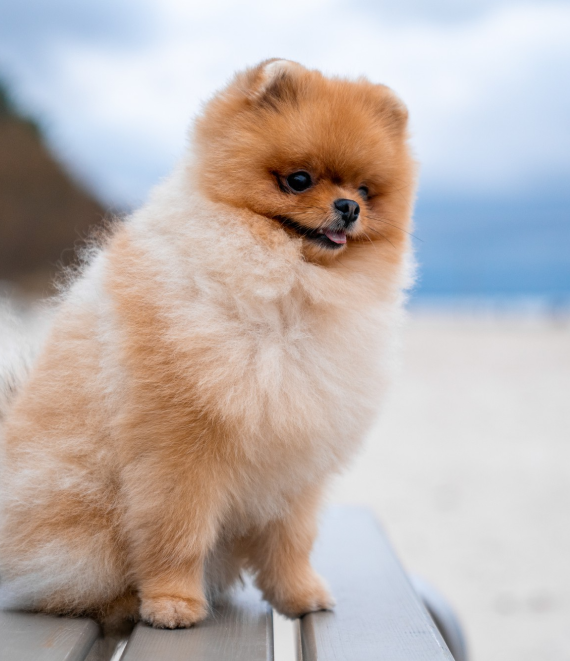
Training your Pomeranian puppy can indeed present its share of challenges. The process may sometimes feel strenuous, requiring patience, consistency, and an understanding of your puppy's unique personality and learning pace. Yet, the joy it brings is immeasurable. As your puppy learns, grows, and adapts, you'll not only witness their progress but also experience the profound satisfaction of molding their behavior. Watching your Pomeranian transform into a well-behaved and understanding companion is a reward like no other, truly justifying every effort you've put into their training. Enjoying a harmonious relationship with your pet, built on mutual respect and understanding, makes every challenge encountered along the way worthwhile.
